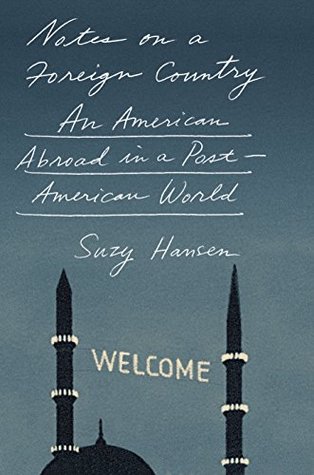More on this book
Community
Kindle Notes & Highlights
by
Suzy Hansen
Read between
November 27 - December 5, 2020
How could I, as an American, understand a foreign people, when unconsciously I did not extend the most basic faith to other people that I extended to myself? This was a limitation that was beyond racism, beyond prejudice, and beyond ignorance. This was a kind of nationalism so insidious that I had not known to call it nationalism; this was a self-delusion so complete that I could not see where it began and ended, could not root it out, could not destroy it. Yet
My assumption had been that any social revolution that resulted in a country becoming more “modern,” in the American sense, must have been a good thing. In Turkey, not only had this revolution been damaging, but it hadn’t worked. It was strange, I was as critical of the United States as I thought one could be. But at that point, I still had no idea that with even those political views came an unassailable, perhaps unconscious faith in my country’s inherent goodness, as well as in my country’s Western way of living, and perhaps in my own inherent, God-given, Christian-American goodness as well.
Here’s the thing: no one ever tells Americans that when they move abroad, even if they are empathetic and sensitive humans—even if they come clean about their genetic inability to learn languages, even if they consider themselves leftist critics of their own government—that they will inevitably, and unconsciously, spend those first months in a foreign country feeling superior to everyone around them and to the nation in which they now have the privilege to live.
It was possible that our highly valued American individualism might have been the ultimate force that detached citizens from the actions of their government, and from the fate of the country as a whole.
The American empire was harder to see because it had no beginning and no end. Ours was an empire that had not begun with conventional invasions. Our empire began with an invasion of itself. We were rebels against tyranny who made a nation out of tyrannizing others, we were the revolutionaries who exalted self-determination while robbing it from others.
“Bin Laden rejected the secular, liberal language of universal human rights and international law,” Makdisi writes, because “they had done nothing to protect Muslims around the world.”
Americans likely didn’t know was that the Iraqi government had for a long time provided its people with adequate health care, schools, and social programs. “Baghdad University in the 1980s had more female professors than Princeton did in 2009,” according to the British-Pakistani writer Tariq Ali. Literacy was almost ninety percent, people had gone to university for free. Sanctions only hastened Iraq’s decline.
The long arm of American power allowed for most Americans to remain completely isolated from the foreigners they were in denial of ruling; there would never be any guts to splay with a bayonet. For many of us, there may not even be a bayonet. We would not know them, and therefore, as Baldwin said, could not love them, could not care so much for their deaths. Distance, distance, distance was the American way, a frigid, loveless distance, a kind of power and violence that destroyed intimacy in all its other manifestations, that destroyed empathy in all of its imperial citizens, in us, in me.
“Empires rot from the inside even as emperors blame the barbarians.”
When you are in love, you feel a superhuman amount of empathy because, crucially, it is in your self-interest to do so. It wasn’t until I loved like this that I could understand why only love could solve America’s race problem, and by extension its imperial one: that it is not until one contemplates loving someone, caring about that person’s physical and emotional well-being, wanting that person to thrive, wanting to protect that person, and most of all wanting to understand that person, that we can imagine what it would feel like if that person was hurt, if that person were hurt by others or,
...more


